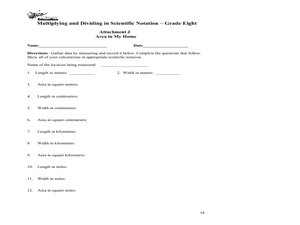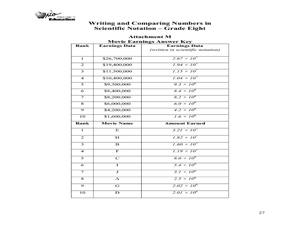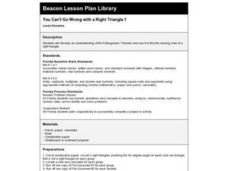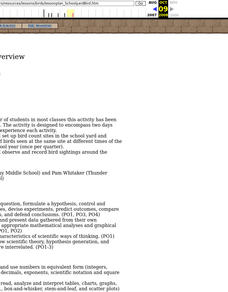Curated OER
Vowels, Reading Fluency
Third graders practice identifying words with the short o vowel sound. They use the strategy will reading a page from The Hare and the Tortoise. They read the passage while focusing on increasing their reading fluency and practice...
West Contra Costa Unified School District
Simplifying Radicals – Day 1
It doesn't get simpler than this. Scholars first learn to simplify radicals by determining the prime factors of the radicand. The lesson progresses to simplifying radicals involving algebraic expressions in the radicand.
EngageNY
Multiplying and Dividing Expressions with Radicals
That's radical! Simplifying radicals may not be exciting, but it is an important skill. A math lesson provides explanations of properties used throughout the material. Scholars practice skills needed to multiply and divide...
Bob Prior
The Order of Operations
Your learners use many different number representations like positive and negative integers, exponents, radicals, and combinations of operations as they learn and strengthen their use of the order of operations. Thoughtfully organized to...
Willow Tree
Linear Relationships
There's just something special about lines in algebra. Introduce your classes to linear equations by analyzing the linear relationship. Young mathematicians use input/output pairs to determine the slope and the slope-intercept formula to...
EngageNY
Adding and Subtracting Expressions with Radicals
I can multiply, so why can't I add these radicals? Mathematicians use the distributive property to explain addition of radical expressions. As they learn how to add radicals, they then apply that concept to find the perimeter of...
Willow Tree
Order of Operations
It's the classic please excuse my dear aunt sally strategy to remembering the order of operations. Young mathematicians practice to develop an understanding of the order of operations. Examples and practice problems include...
Alabama Learning Exchange
Classifying Complex Numbers
Imaginary numbers are a real thing. Scholars learn about complex numbers, real numbers, and imaginary numbers. They classify given numbers as strictly complex, strictly real, or strictly imaginary in an individual or group activity.
Institute of Electrical and Electronics Engineers
Insulators and Conductors
In a classic activity, emerging electricians test various objects for electrical conductivity in a circuit. Each group constructs a simple circuit by following a diagram. Predictions are made and objects are inserted into the circuit,...
Curated OER
The Golden Students
Scholars view the video, "Donald Duck in Mathmagic Land," and discuss examples in nature which have proportions of the golden ratio. They measure and record different body lengths from a worksheet and convert the ratios to equivalent...
Ohio Department of Education
Multiplying and Dividing in Scientific Notation - Grade 8
Here is really nice set of resources on scientific notation. Eighth and ninth graders explore the concept of multiplying and dividing in scientific notation. In this multiplying and dividing numbers in scientific notation...
Ohio Department of Education
Writing and Comparing Numbers in Scientific Notation-Grade Eight
Explore scientific notation in this mathematics lesson. Young mathematicians explore multiple representations of large number in scientific notation through the use of models, visual representation and expanded form. The lesson provided...
Curated OER
How Simple Is Your Rational Expression?
Investigate simplifying rational expressions. Learners define rational expressions, review how numerators and denominators are polynomials and complete several problems using a checklist to ensure they don't skip any steps. Work can be...
Curated OER
To Quote or Not to Quote
Introduce your middle and high schoolers to the correct use of quotation marks. They identify examples of correct and incorrect quotations in magazines and edit a paragraph in groups. Use this lesson as a way to reinforce proofreading...
Curated OER
Flying with Pythagoras
A lengthy narrative about Pythagoras and his students precedes an activity in which your young mathematicians practice using the Pythagorean theorem to solve three problems about flight and distance. Answers are provided.
Curated OER
You Can't Go Wrong with a Right Triangle 1
Fourth and fifth graders study the Pythagorean Theorem and apply it to find the missing side of a right triangle.
Illustrative Mathematics
Applying the Pythagorean Theorem in a Mathematical Context
Participants who use this resource will apply the Pythagorean Theorem to show whether or not the shaded triangle inscribed in a rectangle is a right triangle. Once all of the sides on the shaded triangle are found, it is important that...
Illustrative Mathematics
Comparing Rational and Irrational Number
Algebra learners must know how to use rational numbers to approximate irrationals. This resource asks participants to decide which number is larger without using a calculator. It makes a great exercise to use as a five-minute transition...
Curated OER
Does Your Rectangle Have Guts?
Does it? Kids find the perimeter and area of different shapes to assess whether their rectangle has guts. In addition to finding the area of a rectangle, learners work to find the area of a trapezoid. All worksheets are included.
Curated OER
The Pythagorean Theorem Lesson 2
Learners discuss and review examples of the Pythagorean Theorem using a GSP, Geometer's Sketchpad, activity.
Manchester University
Lesson 51: Scientific Notation
Discuss scientific notation with this mathematics lesson. Middle schoolers predict which problem is bigger of two numbers. They analyze the problems by observing the powers of 10 in order to decide which is bigger. This appears to be an...
Curated OER
Schoolyard Bird Project
Students observe and count bird sightings around their schoolyard throughout the school year.
Curated OER
You Can't Go Wrong with a Right Triangle 2
Upper graders use the properties of right angle trignonmetry to measure objects such as the school flagpole. They solve real world problems using these properties.
Curated OER
Multiplying Polynomials
Help learners study polynomials. They will review how to multiply polynomials either by using the FOIL method if they are multiplying a binomial by another binomial, or by using the distributive property.























